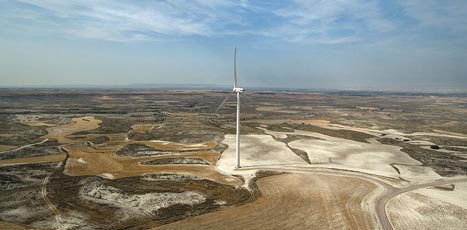Wind power is becoming an increasingly important part of Bulgaria’s energy mix as the country seeks to diversify its energy sources, reduce greenhouse gas emissions, and meet European Union (EU) renewable energy targets. With its favorable geographic location and growing investment in wind energy infrastructure, Bulgaria is well-positioned to capitalize on the benefits of wind power and make significant strides in its energy transition.
Bulgaria’s wind energy potential is largely due to its geographical location, which features a long coastline along the Black Sea and mountainous terrain in the southern and western parts of the country. These factors create favorable conditions for the development of both onshore and offshore wind farms. According to the European Wind Energy Association, Bulgaria has the potential to generate up to 3,400 MW of wind power, which would be enough to meet approximately 40% of the country’s electricity demand.
In recent years, Bulgaria has made significant progress in expanding its wind energy capacity. In 2019, the country’s installed wind power capacity reached 708 MW, an increase of nearly 60% compared to 2010. This growth has been driven by a combination of government support, EU funding, and private sector investment. The Bulgarian government has implemented a range of policies to promote renewable energy development, including feed-in tariffs, tax incentives, and streamlined permitting processes for wind energy projects.
The EU has also played a key role in supporting Bulgaria’s wind energy sector, providing funding for research, development, and infrastructure projects through programs such as the European Regional Development Fund and the Horizon 2020 research and innovation program. These investments have helped to improve the efficiency and cost-competitiveness of wind power in Bulgaria, making it an increasingly attractive option for both public and private sector investors.
Private sector involvement in Bulgaria’s wind energy sector has been growing steadily, with both domestic and international companies investing in wind farm development and operation. Notable examples include the 156 MW St. Nikola Wind Farm, which was developed by a consortium of Bulgarian and German companies, and the 60 MW Kavarna Wind Farm, which was developed by a Danish-Bulgarian joint venture. These projects demonstrate the potential for successful collaboration between Bulgarian and international partners in the wind energy sector.
As Bulgaria continues to expand its wind power capacity, the benefits of this renewable energy source are becoming increasingly apparent. Wind power is a clean, sustainable, and abundant source of energy that can help to reduce the country’s reliance on fossil fuels and decrease greenhouse gas emissions. Furthermore, the development of wind energy infrastructure can create jobs and stimulate economic growth in rural and coastal areas where wind resources are most abundant.
However, there are also challenges associated with the growth of wind power in Bulgaria. One key issue is the need to upgrade and expand the country’s electricity grid to accommodate the increasing share of renewable energy. This will require significant investment in grid infrastructure and smart grid technologies, as well as coordination between government, industry, and grid operators to ensure that the integration of wind power is managed effectively.
Another challenge is the need to address concerns related to the environmental and social impacts of wind energy development, such as noise pollution, impacts on wildlife, and the visual impact of wind turbines on the landscape. These issues can be addressed through careful planning, stakeholder engagement, and the implementation of best practices for wind farm design and operation.
In conclusion, wind power is playing a growing role in Bulgaria’s energy mix as the country seeks to transition to a more sustainable and diversified energy system. With its favorable geographic conditions, supportive policy environment, and growing investment in wind energy infrastructure, Bulgaria is well-positioned to capitalize on the benefits of wind power and make significant progress in its energy transition. However, addressing the challenges associated with grid integration and environmental and social impacts will be crucial to ensuring the long-term success of Bulgaria’s wind energy sector.


